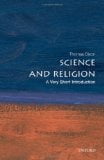 Science and Religion: A Very Short Introduction
Science and Religion: A Very Short Introduction
by Thomas Dixon
Oxford University Press, £7.99 (pb), ISBN 978-0-19-929551-7
The author is a historian, and he promises “an informative and even-handed account of what is really at stake” between science and religion. In 150 pages, it is informative and on the whole even-handed. But it is an introduction to some of the well known controversies, rather than to basic issues between science and religion. Nowhere does he tell us what he understands by these terms. Religion in particular covers a large range of activities, not all shared by all creeds. It is effectively limited here, as he acknowledges, to Christianity and Islam, which differ from many others. The main controversies dealt with are Galileo, how God interacts with nature, if at all, evolution, creationism, and morality. Dixon rightly stresses that there is never a simple fight between the scientific goodies (or baddies) and religious baddies (or goodies). And that the controversies are invariably entangled with social, political, economic and other factors.
He is also right that they are likely to continue. Even-handedness can lapse into relativism. For example, in his conclusion Dixon says: “From within a particular world view or ideology, certain maxims will seem fundamental and unalterable: for a Muslim, the truth of the Quran; for a Christian, the fact of the resurrection; for an atheist, the purely human nature of all moral codes”. But “seeming” is not all there is to it. And Occam’s razor, I suggest, separates the first two from the third. There is ample evidence that moral codes exist and that humans make them. There is no equivalent evidence for the other two, or for an additional non-human source of morality. Atheism is not another belief, but an absence of belief. I suggest also that neither science nor religion is an agent.
There are scientifically or religiously disposed people, who may be opposed or in agreement or, very often, confused. And insofar as science and religion are entities, they are not the same kind of entity. Such issues need to be sorted, if only briefly, before describing particular conflicts. Otherwise we cannot understand what is “really at stake”. The book ends with ten pages of suggested further reading. In short: good, but could be better.



